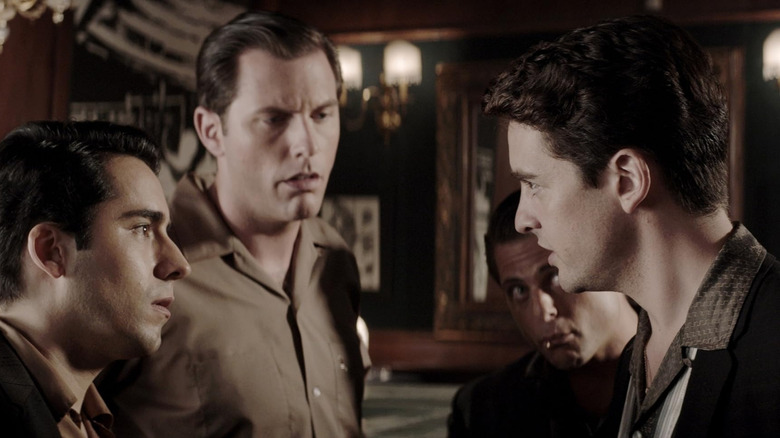Keith Bernstein/Warner Bros. Pictures
Musicals are meticulously designed to uplift spirits. Regardless of the plot, there’s a certain joy that comes from watching individuals express their deepest emotions through song and dance for over two hours. Broadway giants like Stephen Sondheim and Andrew Lloyd Webber have capitalized on this fact, transforming tragic love stories and horrifying thrillers into crowd-favorites filled with murder, revenge, and the terror of dealing with a needy, self-absorbed leading actor. Even when the story ends in grief and despair, you exit the theater humming catchy tunes, riding high on endorphins. This is true even if you’ve only just seen “Cats” for the first time, perhaps experiencing a different type of high.
So, what happens when you bring in Clint Eastwood, known for his cinematic melancholy, to direct your Broadway hit? You end up with “Jersey Boys,” potentially one of the most gloomy and grim musicals to ever hit the screen. If you’ve ever pondered whether “Mystic River” or “Million Dollar Baby” would be slightly less depressing if the characters sang about their feelings amidst the agony, loss, and chaos, the answer, based on “Jersey Boys,” is likely not. Nevertheless, it’s not difficult to understand why “Jersey Boys” didn’t do well upon its 2014 release. However, its gloominess renders it unique within the contemporary movie musical scene.
Jersey Boys Under Eastwood: A Unique Take on a Broadway Crowd-Pleaser

Warner Bros. Pictures
Eastwood’s subdued and somber portrayal of the quick rise to fame of the 1960s rock ‘n’ roll sensation, The Four Seasons, and the subsequent good (and particularly bad) times is more faithful to the source material than you might think. The original Broadway musical, penned by Rick Elice and Marshall Brickman (yes, the Oscar-winning co-writer of “Annie Hall”), opted for a realistic narrative of the band’s journey rather than a fantastical representation, essentially becoming a live theater documentary. With this in mind, Eastwood strayed away from the whimsical elements typical of a biopic musical like “Rocketman.” Instead, majority of the songs are diegetic, presented in a realistic manner whether it’s the band performing live with Eastwood and his trusted cinematographer Tom Stern maintaining a steady, straightforward coverage and muted color palette, or the band’s music being used as background for montages, many of which highlight the band’s more sorrowful moments.
This results in a film that feels like a more somber version of “That Thing You Do!”… and that’s before the breakout success of the Seasons (thanks to timeless pop classics like “Sherry” and “Big Girls Don’t Cry”) is tainted by internal disputes, mob debts, and family strife. While Tom Hanks’ musical dramedy about a fictional ’60s band’s rapid rise up the Billboard charts managed to balance its nostalgic charm with more sobering moments, Eastwood’s unyieldingly harsh approach clashes with the scenes where “Jersey Boys” tries to be more lighthearted and charming. This sentiment is widely agreed upon, as demonstrated by the film’s Rotten Tomatoes ratings (51 percent from critics, with the audience score only slightly higher at 62 percent) and underwhelming box office performance ($67 million worldwide against a $40 million budget).
Regardless, “Jersey Boys,” with its soulful music, explorations of flawed masculinity, and a poignant narrative about the costs of lifelong fame, is as personal as any other film Eastwood has directed. Despite its shortcomings, it succeeds as an anti-Broadway crowd-pleaser and a rare musical that may leave you feeling more downcast than you were before watching it. (That is, if you’re into that sort of thing.)
Credit: www.slashfilm.com


